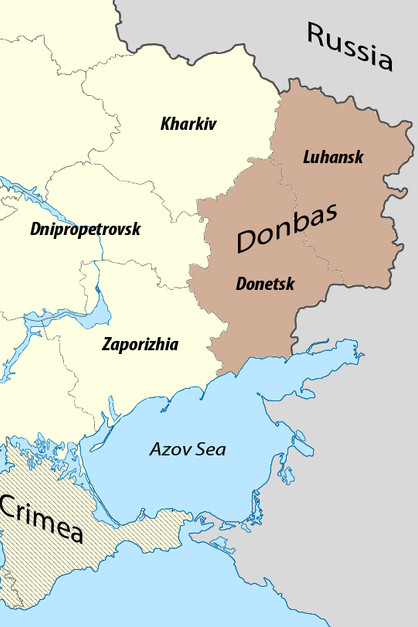Austria's Reaction to Putin's Disrespect for the Territorial Integrity and Sovereignty of Eastern Ukraine
Following President Putin's decision to recognize the independence of Luhansk and Donetsk in the Donbas region of Ukraine and to send "peacekeeping troops" to these areas, the Austrian government's Crisis Cabinet met to discuss how to respond. Read what Chancellor Nehammer said about the act of Russian aggression and what Austria will do.
 Austrian Chancellor Karl Nehammer: "After the recognition of the independence of Donetsk and Luhansk and the deployment of so-called peacekeeping troops, the signs are unfortunately increasingly pointing to confrontation." / Picture: © Wikimedia Commons / RGloucester, CC BY-SA 3.0 (https://creativecommons.org/licenses/by-sa/3.0)
Austrian Chancellor Karl Nehammer: "After the recognition of the independence of Donetsk and Luhansk and the deployment of so-called peacekeeping troops, the signs are unfortunately increasingly pointing to confrontation." / Picture: © Wikimedia Commons / RGloucester, CC BY-SA 3.0 (https://creativecommons.org/licenses/by-sa/3.0)
The Austrian government held a Crisis Cabinet meeting on the current situation in Ukraine after Russian President Vladimir Putin decided to officially recognize the independence of Luhansk and Donetsk in the Donbas region of Ukraine and to send Russian “peacekeeping troops” into these areas.
Along with the chancellor, the Crisis Cabinet is made up of the vice chancellor and representatives of the Ministries of Foreign Affairs, Defense, Interior, Economics and Energy.
In a press statement after the meeting, Chancellor Karl Nehammer said, “The situation has deteriorated massively after President Putin's speech yesterday. After the recognition of the independence of the self-proclaimed People's Republics of Donetsk and Luhansk and the deployment of so-called peacekeeping troops, the signs are unfortunately increasingly pointing to confrontation.”
Chancellor Nehammer explained that the recognition of the independence of the self-proclaimed People's Republics of Donetsk and Luhansk is in “clear contradiction” to the Minsk Agreement.
By violating Ukraine’s territorial integrity and sovereignty, Russia is breaking the agreement and making a diplomatic solution more difficult.
The chancellor said that, as a result of this, the Russian ambassador in Austria was summoned to the Foreign Ministry.
“Furthermore, the EU will react as one. In consultation with Commission President Ursula von der Leyen and EU Council President Charles Michel,” he added.
Nehammer also expressed his support for a phased approach of putting the first European sanctions into effect as a response to the act of Russian aggression.
The decision on which sanctions to implement will be made by the EU foreign ministers.
The Austrian chancellor stated that it was important that the wide range of sanctions options be used in a targeted manner, as it could be assumed that “we have not yet reached the peak of escalation.”
Support for resumption of dialogue within the OSCE
Nehammer stated that Austria is providing 12 observers to the Organization for Security and Cooperation in Europe (OSCE) as part of peacekeeping and has offered more if necessary.
Austria is committed to neutrality, but that doesn't mean that it doesn't have a clear opinion.
“Above all, we have a clear opinion when international law is violated. Austria knows how much it matters that there is the strength of law as the basis for action and that the law of the strongest must not lead to policy,” emphasized the chancellor.
He added that everything possible must be done to ensure that diplomacy does not come to a standstill, despite the failure of previous attempts to resolve the conflict diplomatically.
Austria, he said, is reviewing all options to support Ukraine and is engaged in dialogue.
“Politics combined with violence no longer has any place on European soil.” Austria is therefore massively committed to a resumption of dialogue within the framework of the OSCE, he said.
The OSCE Secretary General has thanked Austria for providing observers, and Austria has offered its continued assistance “where it is deemed necessary.”
Energy supply guaranteed
Chancellor Nehammer also tried to ease the concerns of the population on the subject of energy supply security.
He explained that, according to the Energy Minister, there would be enough energy even in the event of a complete shutdown from the Russian Federation.
Commission President Von der Leyen had also given assurances that alternative suppliers would be made available to compensate for gas supply failures.
Crisis team dispatched to Ukraine for possible evacuation of Austrians
Another topic of discussion was the possible evacuation of Austrians from Ukraine.
The situation is currently calm and safe, but an additional crisis team has been sent to Kiev to be able to react quickly.
The team, consisting of a special Cobra unit, as well as the National Defense Fighter Command, has been tasked with preparing evacuation measures.
The government has said that there are 148 Austrians in Ukraine. The chancellor reported that 52 people have applied for assistance and that they are currently trying to contact 27 people.
Nehammer calls on Russia to “use its military strength for peace not war”
Other topics of the meeting were the assessment of internal security, the protection of critical infrastructure, possible refugee movements and the consequences of economic sanctions on Austrian companies.
The chancellor stated that he would accept the offer of the EU Commission President to provide compensation payments for losses.
Nehammer called on the Russian Federation to use its military strength for peace and not for war and to return to the negotiating table.
“War is always the worst of all answers that comes at the end of a failed negotiation process,” he said.
He expressly thanked the Ukrainian President for the “extraordinary prudence” in not engaging in any military provocations or confrontations.
“The situation is serious, it shows how important a strong, cohesive European Union is. Austria will also make its contribution to this unity and strength,” concluded the chancellor.



